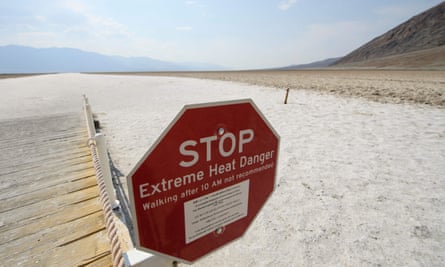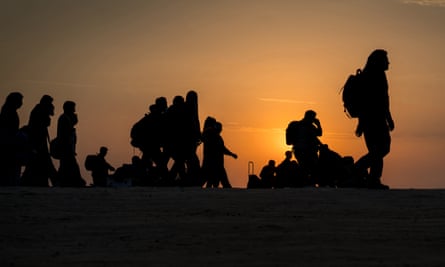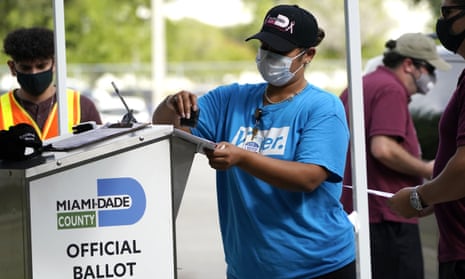Good morning.
Florida Republicans intentionally targeted Black voters in voting restrictions enacted last year, the justice department has said in a court filing.
The department said it agreed with a lower court’s findings that Florida lawmakers enacted new rules with the knowledge they would harm Black voter turnout. The Florida law violated section 2 of the Voting Rights Act, which prohibits racial discrimination in voting practices, the department said.
“The district court’s core factual findings are that, in the face of surging turnout in the 2020 election, the Florida legislature responded by enacting provisions that impose disparate burdens on Black voters,” DoJ lawyers wrote in their brief. “Which were chosen precisely because of those burdens to secure a partisan advantage. The court’s findings of discriminatory intent are a permissible view of the record based on the entirety of the evidence.”
Florida lawyers dispute that the law is racially discriminatory.
Are other states’ voting laws being challenged? The department’s voting section has also filed challenges to restrictions in Georgia, Texas and Arizona.
What did the Florida restrictions include? Limiting the availability of absentee ballot drop boxes, regulations for third-party voter registration groups, and a ban on providing food and water to people queueing to vote.
Mike Pence condemns Republicans’ attacks on FBI over Trump search

Former vice-president Mike Pence condemned attacks against the FBI by Republicans following the search of Donald Trump’s Mar-a-Lago property.
Republicans have responded angrily to the FBI’s 8 August search, which was part of a probe into Trump’s handling of classified material.
“I … want to remind my fellow Republicans we can hold the attorney general accountable for the decision that he made without attacking the rank-and-file law enforcement personnel at the FBI,” Pence said on Wednesday. He said the Republicans were “the party of law and order”, adding: “These attacks on the FBI must stop”.
Violence against law enforcement officials is feared since the search as federal authorities warn that it fueled extremists. Last week, an armed man was killed after attacking an FBI office in Cincinnati with an AR-15-style rifle and a nail gun.
Pence will call on the attorney general, Merrick Garland, to fully disclose the reasons behind the recent search, he said.
California urges residents to cut power use amid scorching heatwave

California has called on residents to limit their use of power as a heatwave threatens the state with outages.
With temperatures forecast to reach well beyond 100F during the afternoon, officials asked residents and businesses to switch off lights and appliances and dial down their thermostats to 78F (26C), especially between the critical hours of 4pm and 9pm.
These demands were made over the last two summers too, as the American west reckons with the brutal force of the climate emergency. Power systems withstood heatwaves in 2021 but rolling blackouts for two days in August 2020 left about 400,000 households without power.
What about water supplies? The US government warns that more severe cuts in water usage were needed as important reservoir supplies dwindle.
In other news …

Nineteen retired US generals and former officials have urged the Biden administration to increase the level of arms supplies to Ukraine. They argue that failing to defeat Moscow in Ukraine raises the risk of a later confrontation “on less favourable grounds”.
Brad Pitt’s foundation has reached a settlement with the owners of the New Orleans houses it built in the wake of Hurricane Katrina. The owners will be paid $20.5m after the homes were plagued by mold, electrical fires and unclean water.
Anne Heche’s death has been ruled an accident, according to coroner’s results, which found she died from inhalation injury and burns after her car crash. A full autopsy report was still being completed, the coroner’s office said.
Two-thirds of all UK households – 18 million families – will be trapped in fuel poverty by January, research shows. Fuel poverty is defined as spending more than 10% of income on fuel bills. Meanwhile, two-thirds of Conservative voters support temporary nationalisation of energy firms.
Stat of the day: 90% coverage for Rwanda’s HPV vaccination programme

Rwanda could become the first country in Africa, and possibly the world, to eradicate cervical cancer. Its national HPV vaccination campaign has consistently achieved over 90% since beginning in 2011, surpassing countries including the UK in coverage, and the country is rapidly expanding cervical cancer testing. About 90% of deaths from the disease occur in low and middle-income countries.
Don’t miss this: the joys and challenges of switching to a four-day week
People in the UK worked for more than an hour above the EU average of 40.5 hours a week in 2019, but had lower hourly output than other G7 countries. In June, the country began the biggest trial of a four-day work week in the world, with more than 3,300 employees participating. Ammar Kalia speaks to participants in the scheme about the successes, challenges and lessons learned.
Climate check: ‘Migration is our way out of this crisis’

The climate crisis will force large populations to migrate – not just to nearby cities, but across continents. Those living in regions with more inhabitable conditions, especially nations in northern latitudes, must prepare to accommodate millions of migrants while also adapting to a changing world. Gaia Vince explores how this is predicted to coincide with demographic issues, as the global north has a large elderly population: “Managed right, this upheaval could lead to a new global commonwealth of humanity. Migration is our way out of this crisis.”
Last Thing: Japan aims to boost alcohol consumption

While some countries run campaigns about alcohol’s health risks, the Japanese government is launching a competition to boost alcohol consumption. It comes after a change in attitudes among the young led to tax revenue falling. Japan’s health ministry said it hoped the campaign would also remind people to drink only the “appropriate amount of alcohol”.
